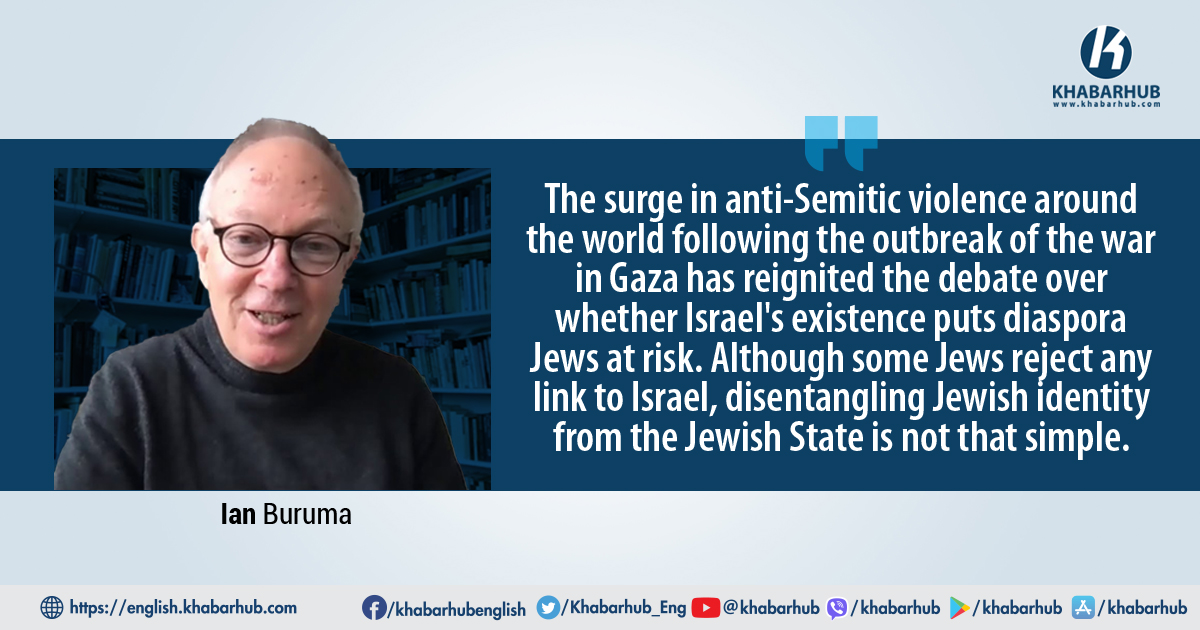In 2009, the late British historian Tony Judt argued that Israel’s identity as a uniquely Jewish state was “bad for Israel” and “bad for Jews elsewhere who are identified with its actions.”
While his remarks incited controversy at the time, the global reaction to the ongoing Hamas-Israel war in Gaza appears to have proven him right, as Jews around the world find themselves blamed for Israel’s alleged “genocide” against the Palestinian people.
Over the past six months, reports of the atrocities in Gaza have been followed by spikes in anti-Semitic incidents in cities like London, New York, and Vienna. Synagogues have been defaced with hateful slogans, Jewish cemeteries have been desecrated, and individuals identified as Jews have been harassed.
To be sure, many Jews are actively participating in antiwar protests calling for a free Palestine “from the river to the sea,” and it is wrong to conflate any criticism of Israeli Prime Minister Binyamin Netanyahu’s far-right government with anti-Semitism.
But it is also true that some people have rushed to label Israel’s conduct in Gaza as genocide with an eagerness unseen in reactions to mass violence in places like Syria, Sudan, or even Ukraine.
This disproportionate attention suggests that criticizing Israeli actions may serve as a relief for those who are tired of being made to feel guilty about the Holocaust.
Israeli governments bear some responsibility for this resentment, not just because of their appalling treatment of Palestinians over the years but also because Israeli officials frequently invoke the Holocaust to justify the country’s cruel policies.
Originally designed to establish Israel as a refuge from anti-Semitism, this law has been criticized for its vague definition of Jewish identity.
Since the 1961 trial of Adolf Eichmann in Jerusalem, Israel has claimed to speak for all of the Holocaust’s victims. If Israel had existed in the 1930s, the argument goes, six million Jewish lives would have been saved from the Nazi inferno.
This is presumably why Israeli President Isaac Herzog was invited to attend the opening of Amsterdam’s new Holocaust Museum on March 10.
When Gaza exploded in violence and Herzog claimed that an “entire nation” was responsible for Hamas’s October 7 massacre of Israeli citizens and that there were no innocent civilians in Gaza, it was deemed too late to rescind the invitation.
This ignited widespread protests, with demonstrators screaming pro-Palestinian slogans at Jews filing into the Amsterdam synagogue to remember the Dutch Jewish community that had been almost entirely annihilated by the Nazis.
Judt’s answer to Jews being equated with Israel was to separate Jewish identity from the Jewish State. “We could thus hope,” he wrote, “to establish a natural distinction between people who happen to be Jews but are citizens of other countries; and people who are Israeli citizens and happen to be Jews.”
Judt was not the first to suggest this. The Hungarian-born writer Arthur Koestler – like Judt, a former Zionist – argued that Jews who wanted to live as Jews should relocate to Israel, whereas those who did not should stop identifying as Jews.
While this may seem like a simple solution, it is not, because the self-perception of Jews does not necessarily change how non-Jews see them.
There is indeed no reason for Jews to defend Israel’s policies, and many don’t. But the fact that some Jews in Europe and the United States feel that persecution is a thing of the past does not mean that Jews in less privileged regions do not face adversity.
During the Holocaust, secular Jews who viewed themselves as Germans first were gassed alongside Orthodox Jews from Polish shtetls.
The clearest expression of Israel’s Jewish character is the 1950 Law of Return, which grants every Jew the right to move there.
Originally designed to establish Israel as a refuge from anti-Semitism, this law has been criticized for its vague definition of Jewish identity.
Currently, it enables anyone with at least one Jewish grandparent or those who have converted to Judaism to qualify for Israeli citizenship.
This is patently unfair to the Palestinians whose families were expelled from their ancestral lands by Jewish forces during the 1948 war.
Why should a French or Russian person with one Jewish grandparent be allowed to immigrate to Israel while the descendants of Palestinian refugees cannot?
As long as this remains the case, it will be hard for Jews to totally dissociate themselves from Israel. And even if diaspora Jews deny any connection with Israel, many non-Jews will insist on it. After all, identity is often imposed on us by others – a reality with which Jews are all too familiar.
Many Jews might say that they feel no affinity whatsoever with Israel and resent any suggestion that they should feel loyal to it, or defend its policies.
There is indeed no reason for Jews to defend Israel’s policies, and many don’t. But the fact that some Jews in Europe and the United States feel that persecution is a thing of the past does not mean that Jews in less privileged regions do not face adversity.
It is also true that Israel today hardly appears to be a safe haven, partly through the machinations of its own government, but that doesn’t alter the principle.
Even so, one might argue that Israel should reconsider the Law of Return as an outdated policy that makes lasting peace with the Palestinians all but impossible.
But while repealing this law would certainly be fairer to the Palestinians, doing so would also compromise Israel’s founding principle as a sanctuary for Jews in need.
Overlooking Israel’s role as a potential refuge shows a certain lack of solidarity and imagination. Unless one believes that Jews have the right to their state because God promised the holy land to the Jewish people, the ideal of building a homeland for all persecuted Jews remains the strongest rationale for its existence.
As long as this remains the case, it will be hard for Jews to totally dissociate themselves from Israel. And even if diaspora Jews deny any connection with Israel, many non-Jews will insist on it. After all, identity is often imposed on us by others – a reality with which Jews are all too familiar.
(Ian Buruma is the author of numerous books)
Copyright: Project Syndicate









Comment